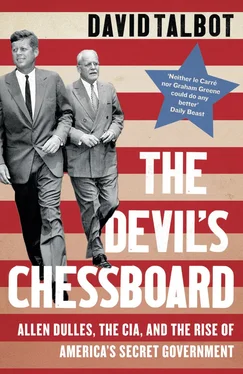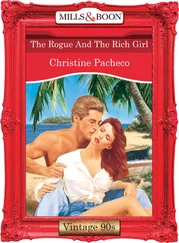1 ...7 8 9 11 12 13 ...45 Even if Himmler had made it to Switzerland, however, he would not have found sanctuary. He was too prominent a face of Nazi horror for even Dulles to salvage. But the American spy would come to the rescue of many other Nazi outlaws from justice.
Neither Allen, Foster, nor their three sisters were ever as devout as their father, the Reverend Allen Macy Dulles, who presided over a small Presbyterian flock in Watertown, New York, a sleepy retreat favored by New York millionaires near Lake Ontario. But the siblings always regarded the family’s summer vacations on nearby Henderson Harbor as some kind of heaven. The huge lake and its sprinkling of islands held countless adventures for the children. The boys would rise earlyin the morning and, in the company of a lean, laconic fishing guide, set off in a skiff, stalking the waters for the lake’s delicious smallmouth black bass. At noon, they would ground their little sailboat on one of the islands and cook their catch over a driftwood fire. The fish was fried in crackling pork fat, served with corn and potatoes, and washed down with black coffee. Years later, they would recall these summer feasts as among the best meals of their lives.
Reverend Dulles was not a man of means, and he had difficulty supporting his family on his modest churchman’s salary. His illustrious father-in-law, the luxuriantly bewhiskered John Watson Foster, who had served briefly as secretary of state under President Benjamin Harrison and then established himself as one of Washington’s first power attorneys, was a beneficent presence in the family’s life. Reverend Dulles sometimes resented his dependence on the old man’s generosity. But the whole family thrived during their summer idylls on Lake Ontario, cozily squeezed into a big, red, clapboard cottage that had been built by Grandfather Foster. Their lakeside life was rustic—the house had no electricity and they had to pump their water. But it all seemed enchanted to the children.
There were picnics and moonlight sails, and on the Fourth of July the children would put small candles in paper balloonsand set them floating in the air, watching as the golden lanterns drifted over the glittering water toward Canada. In the early evenings, Eleanor—the next oldest sibling after Allen—liked to sit on the family’s dock and watch the clouds gather over the lake, casting red and pink shafts on the darkening water. “ I never feared helland I thought heaven would be like Henderson but more so,” she mused in her later years.
Eleanor was exceedingly bright and curious, and she refused to resign herself to the prim, petticoat world to which girls of her generation were supposed to confine themselves. When the boys and men would go fishing, she would sometimes plunk herself down in the middle of the boat. When robed Chinese dignitaries and other exotic figures from her grandfather’s diplomatic forays would pay visits to Henderson Harbor, she would be certain to listen in on their conversations. Eleanor’s intelligence and determination would take her far, as she followed her brothers into the diplomatic corps, where she would eventually take over the State Department’s German desk during the critical years after World War II. But, as a brainy woman in a thoroughly male arena, she was always something of an outsider. Even her brothers were often perplexed about how to handle her. With her dark, wiry hair and thick eyeglasses, she considered herself the ugly duckling in the family. Her slightly askew status in the Dulles constellation seemed to heighten her powers of observation, however. Eleanor often had the keenest eye when it came to sizing up her family, especially her two brothers.
Allen loomed large in her life. She attached herself to him at an early age, but she learned to be wary of his sudden, explosive mood shifts. Most people saw only Allen’s charm and conviviality, but Eleanor was sometimes the target of his inexplicable eruptions of fury. Her infractions were often minor. Once Allen flew into a rage over how closely she parked the car to the family house. His moods were like the dark clouds that billowed without warning over Lake Ontario. Later in life, Eleanor simply took herself? “out of his orbit to avoid the stress and furor that he stirred in me.”
Allen was darker and more complex than his older brother, and his behavior sometimes mystified his sister. One summer incidentduring their childhood would stick with Eleanor for the rest of her life. Allen, who was nearly ten at the time, and Eleanor, who was two years younger, had been given the task of minding their five-year-old sister Nataline. With her blond curls and sweet demeanor, Nataline—the baby in the family—was usually the object of everyone’s attention. But that day, the older children got distracted as they skipped stones across the lake’s surface from the family’s wooden dock. Suddenly, Nataline, who had retrieved a large rock to join in the game, went tumbling into the water, pulled down by the dead weight of her burden. As the child began floating away toward the lake’s deep, cold waters, her pink dress buoying her like an air balloon, Eleanor began screaming frantically. But Allen, who by then was a strong swimmer, was strangely impassive. The boy just stood on the dock and watched as his little sister drifted away. Finally, as if prompted by Eleanor’s cries, he, too, began yelling. Drawn by the uproar, their mother—who was recovering in bed from one of her periodic, pounding migraines—came flying down the dock and, plunging into the water, rescued little Nataline.
Throughout his life, Allen Dulles was slow to feel the distress of others. As a father, his daughter Joan would recall, Dulles seemed to regard his children with a curious remoteness, as if they were visitors in his house. Even his son and namesake Allen Jr. made little impact on him when he excelled in prep school and at Oxford, or later, in the Korean War, when the young man was struck in the head by a mortar shell fragment and suffered brain damage. Clover Dulles called her cold and driven husband “The Shark.”
Allen did not take after his father. Reverend Dulles, a product of Princeton University and Germany’s Göttingen University, was a scholarly, meditative type. While his children explored the wilds of Lake Ontario, he was likely to be sequestered in his upstairs study with his Sunday sermon. The minister was a compassionate man. While walking home one frigid day, he took off his coat and gave it to a man shivering in the street. On another occasion, he risked expulsion from the Presbyterian Church for performing a marriage for a divorced woman.
It was her mother, Eleanor would recall, who ran the family. Edith Foster Dulles was“ a doer,” the kind of woman who “believed in action.” Eleanor would remember her cracking the whip on her father. “Now, Allen,” she would tell her husband, “you’ve been working on that book for five or six years. Don’t you think it’s good enough? Let’s publish it.”
The reflective pastor was less of an influence on his sons than their mother and grandfather. The Dulles boys were drawn to the men of action who called on Grandfather Foster, men who talked about war and high-stakes diplomacy, men who got things done. Foster and Allen both lacked their father’s sensitive temperament. Like Allen, Foster felt little empathy for those who were weak or vulnerable. He understood that there was misfortune in the world, but he expected people to put their own houses in order.
Foster’s callousness came into starkrelief during the Nazi crisis in Germany. In 1932, as Hitler began his takeover of the German government, Foster visited three Jewish friends, all prominent bankers, in their Berlin office. The men were in a state of extreme anxiety during the meeting. At one point, the bankers—too afraid to speak—made motions to indicate a truck parked outside and suggested that it was monitoring their conversation. “They indicated to him that they felt absolutely no freedom,” Eleanor recalled.
Читать дальше











